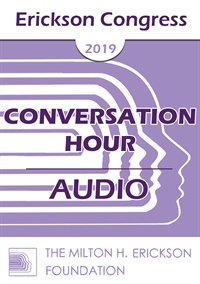
- Average Rating:
- Not yet rated
- Topic Areas:
- Conversation Hours | Therapist Development | Therapeutic Relationship
- Categories:
- Erickson Congress | Erickson Congress 2019
- Faculty:
- Scott Miller, PhD
- Duration:
- 1 Hour 2 Minutes
- Format:
- Audio Only
- Original Program Date:
- Dec 13, 2019
- Short Description:
- In this hour-long discussion, participants will have an opportunity to address questions regarding deliberate practice and their use of routine outcome measures in clinical practice.
- Price:
- $15.00 - Base Price
- Average Rating:
- Not yet rated
- Topic Areas:
- Keynotes | Psychotherapy | Therapist Development
- Categories:
- Erickson Congress | Erickson Congress 2019
- Faculty:
- Scott Miller, PhD
- Course Levels:
- Master Degree or Higher in Health-Related Field
- Duration:
- 50 Minutes
- Format:
- Audio and Video
- Original Program Date:
- Dec 12, 2019
- Short Description:
- What can mental health professionals do to enhance their performance? Available evidence makes clear that clear that attending a typical continuing education workshop, specializing in the treatment of a particular problem, or learning a new treatment model does little to improve effectiveness. In fact, studies to date indicate clinical effectiveness actually declines with time and experience in the field.
- Price:
-
Sale is $29.00
price reduced from Base Price - $59.00
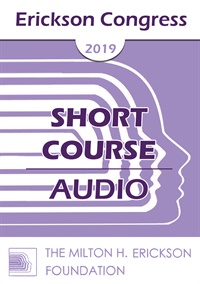
- Average Rating:
- Not yet rated
- Topic Areas:
- Short Courses | Therapeutic Relationship | Therapist Development | Trance | Resistance
- Categories:
- Erickson Congress | Erickson Congress 2019
- Faculty:
- Ilene Wolf, MA, LMFT
- Duration:
- 1 Hour 19 Minutes
- Format:
- Audio Only
- Original Program Date:
- Dec 12, 2019
- Short Description:
- This interactive workshop utilizes the group to teach and apply highly effective trance methods, combined with evidenced-based research from Stanford, and drama therapy action methods, (i.e. sociometric scaling, role reversal to increase empathy and the empty chair), to address clients’ unwillingness to give up defensiveness, blame and other relationship problems.
- Price:
- $15.00 - Base Price
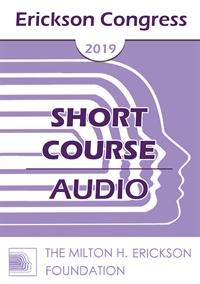
- Average Rating:
- Not yet rated
- Topic Areas:
- Short Courses | Art and Creativity | Hypnotherapy | Psychotherapy | Therapeutic Relationship | Therapist Development
- Categories:
- Erickson Congress | Erickson Congress 2019
- Faculty:
- Richard Hill, MBMSc, MEd, MA
- Duration:
- 1 Hour 30 Minutes
- Format:
- Audio Only
- Original Program Date:
- Dec 12, 2019
- Short Description:
- Hypnotherapy and psychotherapy have been developing over time through various phases. Directive therapies with an intervention orientation have shifted over the years to suggestive and client centered approaches. More recently both research and practice has opened our minds to relational and responsive approaches. The concept of “client responsiveness” is discussed in my book with Ernest Rossi, The Practitioner’s Guide to Mirroring Hands.
- Price:
- $15.00 - Base Price
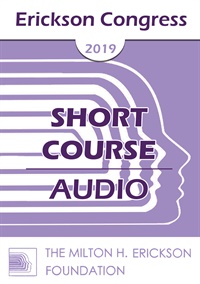
- Average Rating:
- Not yet rated
- Topic Areas:
- Short Courses | Affect | Psychotherapy | Therapist Development
- Categories:
- Erickson Congress | Erickson Congress 2019
- Faculty:
- Bardia Monshi, PhD
- Duration:
- 1 Hour 26 Minutes
- Format:
- Audio Only
- Original Program Date:
- Dec 12, 2019
- Short Description:
- Effective therapy, or coaching, is touching and moving clients. As professionals, we are providing an emotional service because all of our clients’ problems have to do with emotional self-regulation. Therefore, to make therapy effective the impact must be affective!
- Price:
- $15.00 - Base Price
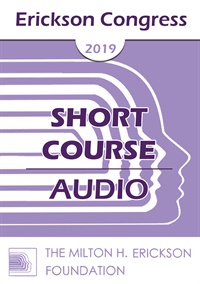
- Average Rating:
- Not yet rated
- Topic Areas:
- Short Courses | Experiential Therapy | Psychotherapy | Therapist Development
- Categories:
- Erickson Congress | Erickson Congress 2019
- Faculty:
- Robert Staffin, PsyD, ABPH
- Duration:
- 1 Hour 30 Minutes
- Format:
- Audio Only
- Original Program Date:
- Dec 12, 2019
- Short Description:
- Often, being dubbed a "master" means that what the teacher does cannot be done by others. However, a cornerstone of Jeffrey Zeig's lifelong quest has been to demystify, annotate, and democratize Milton H. Erickson's work and then his own. In this session, the presenter will map the breadth and scope of Zeig's work, which he has augmented by integrating a theoretical and experimental corpus with the most effective practices of the arts: film, music, theater, literature, and dance.
- Price:
- $15.00 - Base Price
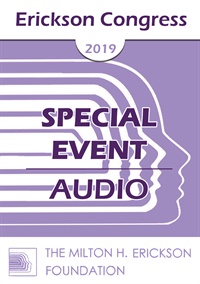
- Average Rating:
- Not yet rated
- Topic Areas:
- Hypnosis | Self-Hypnosis | Multicultural | Therapist Development
- Categories:
- Erickson Congress | Erickson Congress 2019
- Faculty:
- Roxanna Erickson Klein, RN, PhD, LPC, LCDC | Alejandra Diaz, LPC
- Duration:
- 4 Hours 7 Minutes
- Format:
- Audio Only
- Original Program Date:
- Dec 11, 2019
- Short Description:
- This event is designed to educate professionals about the power of self- hypnosis. The workshop offers an experiential approach that is brought together by comparing and contrasting the learning backgrounds from the two co-presenters. Each bringing different life experiences, cultural elements are identified and utilized to facilitate participants’ individual creation of their own learning pathway.
- Price:
- $15.00 - Base Price
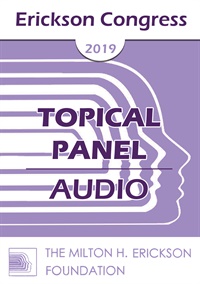
- Average Rating:
- Not yet rated
- Topic Areas:
- Topical Panels | Homework | Therapist Development
- Categories:
- Erickson Congress | Erickson Congress 2019
- Faculty:
- Teresa Garcia-Sanchez, MA | Wendel Ray, PhD | Albina Tamalonis, PsyD
- Duration:
- 59 Minutes
- Format:
- Audio Only
- Original Program Date:
- Dec 13, 2019
- Short Description:
- Therapy happens in life, not just in the consulting room. Assignments facilitate treatment goals.
- Price:
- $15.00 - Base Price
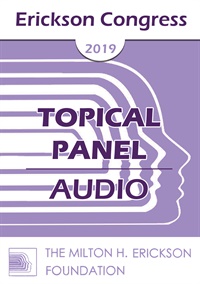
- Average Rating:
- Not yet rated
- Topic Areas:
- Topical Panels | Humor | Therapist Development
- Categories:
- Erickson Congress | Erickson Congress 2019
- Faculty:
- Rick Miller, MSW | Donald Miretsky, M.Ed | Bill O'Hanlon, MS
- Duration:
- 57 Minutes
- Format:
- Audio Only
- Original Program Date:
- Dec 13, 2019
- Short Description:
- Jokes can be used as a vehicle in which therapeutic messages can be couched. Humor can enliven the therapeutic situation.
- Price:
- $15.00 - Base Price
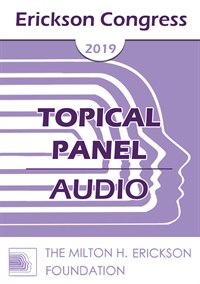
- Average Rating:
- Not yet rated
- Topic Areas:
- Workshops | Binds | Conflict | Therapist Development
- Categories:
- Erickson Congress | Erickson Congress 2019
- Faculty:
- Robert Dilts, BA
- Duration:
- 1 Hour 59 Minutes
- Format:
- Audio Only
- Original Program Date:
- Dec 12, 2019
- Short Description:
- A “double bind” is a special type of conflict which creates a “no-win” situation; i.e., a situation in which one is “damned if you do, and damned if you don’t.” According to anthropologist Gregory Bateson, who originally defined the notion of the double bind, such conflicts are at the root of both creativity and psychosis. The difference is whether or not one is able to identify and transcend the bind in an appropriate way. This workshop will cover some of the key skills necessary to identify the underlying conditions which create conflicts double binds, and thus to resolve them.
- Price:
- $15.00 - Base Price
Please wait ...


